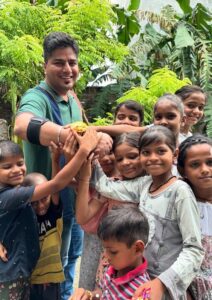Education
A School Without Walls: The Pehchaan Story, Led by Akash Tandon
Sometimes the biggest change begins with the smallest act — a few mats on the ground, five curious children, and a group of young volunteers refusing to look away.
In the heart of Delhi, just steps away from the WHO headquarters and the grandeur of Lutyens’ Delhi, an open drain separates two vastly different worlds. On one side: embassies, privilege, policy. On the other: a slum of over 10,000 people, where childhood is often lost to labour, illness, and invisibility.
It’s here that Pehchaan — The Street School — took root.
“We knew we couldn’t change the world. But we could change someone’s world.”
For co-founder Akash Tandon, Pehchaan wasn’t part of a five-year plan. It was a response. A moment of reckoning, watching children play in a toxic drain, unaware of the danger. “This isn’t water,” they told the kids. “It’s poison.” The kids laughed.
That laugh stayed with them.

So Akash and his friends returned. Not with speeches or slogans — but with notebooks, mats, and the stubborn belief that every child, no matter their address, deserves to learn.
What started as a weekend effort with five students has now grown into a network of 10 centres, reaching over 1,600 children. And yet, Pehchaan remains fiercely grassroots — no paid staff, no office, no formal backing. Just a living, breathing movement powered entirely by volunteers.
Education That Heals
Pehchaan doesn’t just teach. It listens. It adapts. It believes that the first step to learning is dignity — and that means personalised mentorship, trust, and a curriculum that sees the child beyond the textbook.
Children are grouped into three learning tracks: those already in school who need support, dropouts looking to rejoin, and first-time learners who’ve never stepped inside a classroom. The model is lean but layered — with low student-volunteer ratios, personalised goals, and modules that blend academics with life skills.
There’s dance, storytelling, debate, and painting. There’s coding and digital literacy. And there’s space to be seen.
“My school encouraged me to sing, speak, perform,” says Preeti Adhikari, a longtime Pehchaan volunteer. “These children deserve that too. Because it’s not just about marks — it’s about confidence.”
From Drain to Degree
One story stays close to Akash’s heart.
A boy joined Pehchaan in Class 3. He faced pressure to drop out and start working. But he stayed. Pehchaan gave him academic support, counselling, and community. He completed Class 12 with 86%. Then cracked the Delhi University entrance exam.
But the resistance didn’t stop. “What will you earn from books?” neighbours asked. Still, Pehchaan raised the funds, got him into college — and today, that boy teaches at the same centre where he once sat as a student.
“He’s the proof,” Akash says. “That this works. That this matters.”
A System That Runs Without a System
Despite being volunteer-run, Pehchaan operates with the discipline of a corporate team. Every 10 teaching assistants report to a centre head. Weekly reports are filed. Interns handle HR, design, digital media, and curriculum — all without salaries.
In 2024 alone, 8,000+ interns from 75+ colleges joined hands with Pehchaan. Many now lead verticals, train others, or launch their own community learning spaces.
“Earlier I taught five kids,” one intern said. “Now I’m hiring 30 volunteers who each teach five. That’s impact at scale.”
The community, too, is beginning to notice. Blanket drives, nutrition partnerships, and the newly launched Digital Literacy Lab — built with scrap funding and donated laptops — have brought a sense of permanence to the pop-up classrooms.
But the hardest barrier? Still parents.
“You show up for 10 years — then they believe you.”
Convincing slum families to send their children — especially girls — to informal schools was a long battle. Many children still get married by 14. Others are pushed into work.
But when the same group of volunteers keeps returning, year after year, in sun, rain, or smog — trust begins to grow. “We’ve moved beyond convincing now,” Akash reflects. “We’re building the next layer. It’s about dignity.”
Girls who once never stepped outside now give public speeches. Boys once caught in addiction now mentor others.
Akash is clear about the goal: “We don’t want to go pan-India. We want 50 other Pehchaans to emerge. That’s how you scale — by letting go.”
Read the full story in our latest issue, Teacher Warriors 2025.